Searching for the "National Clothes" - "From the Iwakura Mission to the Meiji Constitution ~ The man who went from a poor farmer to becoming the First Prime Minister of Japan" Special Lecture Held by JICA Chair in Paraguay and Argentine.
Day:2023.07.11
event |
-
Professor Kazuhiro Takii, Center for International Japan Studies (Nichibunken), was dispatched as a lecturer and held a special lecture for the JICA Chair program in collaboration with local universities as follows:
Paraguay June 20 (Tue) National University of Asuncion (UNA) June 21 (Wed) National University of Itapúa (UNI)
Argentina June 26 (Mon) National University of La Plata (UNLP)
Dr. Takii specializes in research from the perspective of development and the history of international relations. After moving up from the doctoral program at the Faculty of Law and Graduate School of Law, Kyoto University, he served as an assistant at Kyoto University and as professor at the University of Hyogo. In 2010, he won the Suntory Gakugei Prize for his book "Ito Hirobumi: Intellectual Politician" (Chuo Koron Shinsha), and, in 2022 his book, “Toshimichi Okubo: A Leader Who Connects Knowledge (Shinchosha)”, won the 76th Mainichi Shuppan Culture Award.
Professor Takii gave a lecture focusing on the people involved in the new "nation-building" after the Meiji Restoration, and on what kind of background, experience they have, etc., and how they worked on the modernization of Japan going through human stories.
In commemoration of the 150th anniversary of the Iwakura Mission, Nichibunken is working on a manga, produce in collaboration with Kyoto Seika University / Kyoto International Manga Museum, where the main characters appeared. Through the challenges of the Iwakura Mission 150 years ago, he provided the audience with an opportunity to think about what the modernization of Japan was. The lecture was very easy to understand, the participants listened attentively, and the participants highly evaluated the conference as "impressive" as well as the academics of the universities.
The key message in the lecture is as follows:
Iwakura Mission; to find national clothes
- Even in Western civilization, there are various countries, and the degree of development varies depending on the history and tradition, so we should accumulate national power in a form commensurate with the national situation without rushing.
- As if to tailor clothes to suit our appearance, the nation needs a constitution. The state has a constitution, and the shape of the country becomes clear.
Itō Hirobumi and the enactment of the Meiji Constitution; Meeting with Professor von Stein (University of Vienna)
- What Stein taught is that it will not work if you make a constitution alone, and that in order to work the constitution, you must reshape the "shape of the country" accordingly.
- In order to prevent the government from ceasing, it is important to establish the organization and operation of the government, establish a cabinet system to lead the administration, and universities to develop human resources who will be responsible for administrative activities.
Hirobumi Ito's thoughts;
- Considering his background as a poor farmer, he wanted to create a society where talented and knowledgeable people can demonstrate it.
- The Constitution is a mechanism for conducting politics together with knowledgeable citizens.
- Parliament is supposed to be a place where elected members of the people can discuss, exchange knowledge, make compromises and concessions, and bring harmony. ⇒ Challenges of democracy around the world.
Paraguay
-
1
.
The conference at the National University of Asunción was held with a participation of 110 people at its peak, mainly law students who were granted college credits as part of the academic extension incentive. They actively participated, even though the Faculty of Law is in a different place from the UNA campus. In addition, the Rector herself, Dr. Zully Vera de Molinas, listened carefully to the entire conference and as final comments, mentioned: "I myself had a lot to learn", so it seems that the purpose of the lecture was conveyed.
-
2
.
At the National University of Itapúa (UNI), the lecture was prepared and carried out under the initiative of the university, coordinated by the Vice Rector Dr. Nelly Monges, participant of JICA Chair Invitation Program to Japan in 2022. A total of 169 people participated in in the face-to-face lecture, including students, the Rector of UNI, the Vice Rector, other professors, and staff of the university, as well as representatives of the Nikkei community, members of the Japanese Association of the city of Encarnación.
-
3
.
During the stay in Encarnación, he visited the library at the Nikkei Identity Center of the Japanese Association, he found that many books brought by immigrants at that time were preserved, and many various academic books (law, etc.) from the Taisho era, Showa single-digit era, and Showa 20 ~ 30s were donated and stored. It can be seen that many immigrants at that time were highly educated.
Argentina
-
1
.
The JICA-UNLP Chair at La Plata University is now in its third year and started in April, and Professor Takii's lecture was given as the fifth lecture of the course. About 100 people participated, students of faculty of law, argentine lecturers, researchers on Japan (many of whom are former Japanese government scholarship students), students of Buenos Aires Nichia Gakuin Institute, etc. Professor Takii's lecture was not limited to the history of the Meiji Constitution, but also introduced the significance of the establishment of the Constitution and the spirit flowing through the Meiji Constitution, and the participants listened attentively to the use of manga and other materials currently in production to make it more approachable.
-
2
.
In addition to lectures at the university, the meeting with Professor Daniel Sabsay (President of the Constitutional Studies Association) was held, who is considered the highest authority of the Constitutional Law Society, and others at the Argentine Council on International Relations (CARI)※1 , the largest diplomatic think tank in Argentina. Vice President de Santibañes welcomed and thanked him, Director Takeda, JICA Argentina introduced the purpose of Professor Takii's visit to Argentina, and Professor Takii introduced the background of the Meiji Constitution for about 15 minutes, and then a question-and-answer session and exchange of opinions were held with Professor Recalde and others. The argentine professors
-
※1CARI; A think tank established 1978 by Carlos Manuel Muñiz (former Minister of Foreign Affairs), who was also involved in the establishment of the Argentine Diplomat Training Institute. It consists of diplomats, business, academia, and other experts interested in foreign policy and international relations, and regional committees such as the Asia Commission, as well as various committees specializing in areas such as international security, nuclear energy, the environment, and multilateral issues.
showed a strong interest in the content of Professor Takii's presentations, and the discussion was held in a friendly atmosphere from beginning to end.
Future Initiatives
The series of lectures and exchange of opinions by Professor Takii received high praise at each of the places visited, and from now on, JICA Chair Program will be enhanced and strengthened in each country through collaboration with the International Research Center for Japan Studies (NICHIBUNKEN).




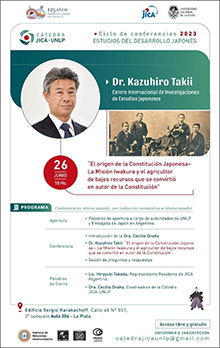
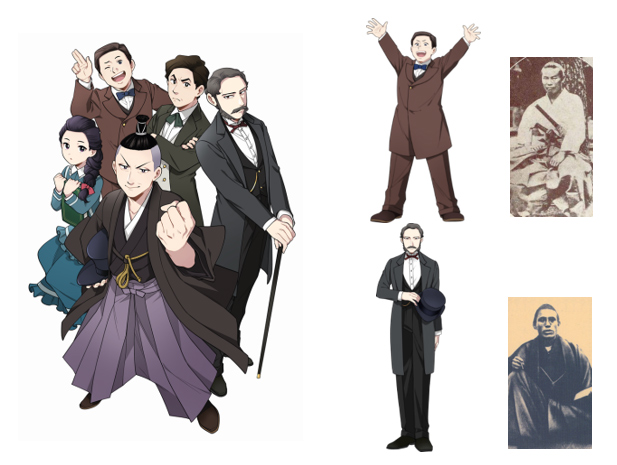
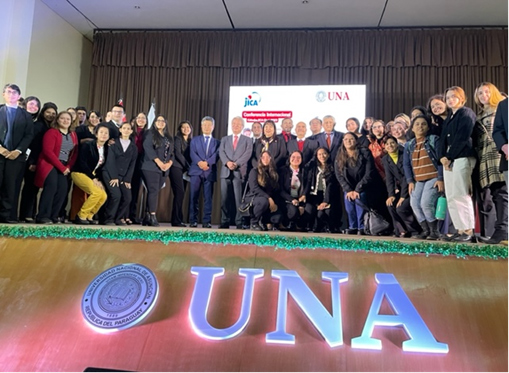
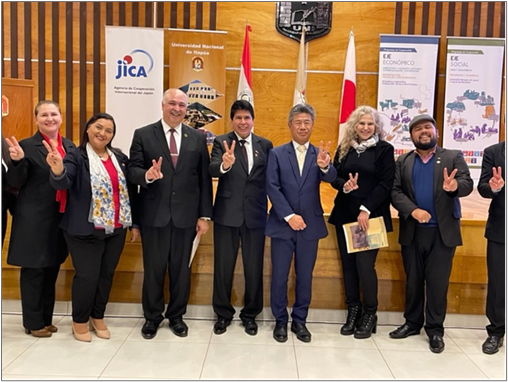
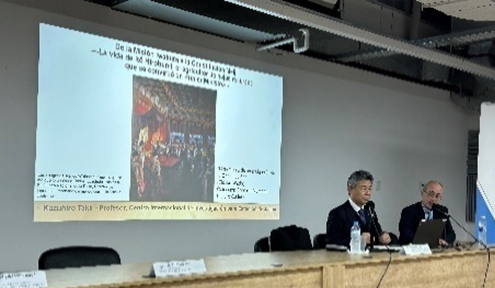
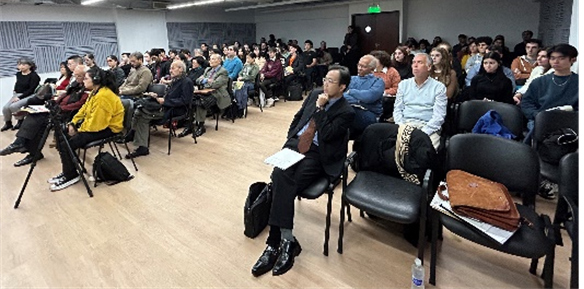
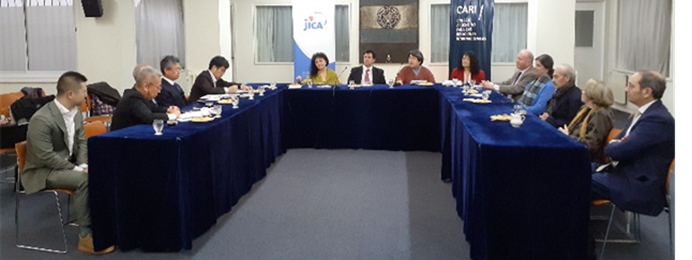
scroll